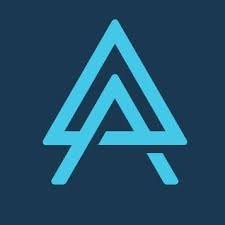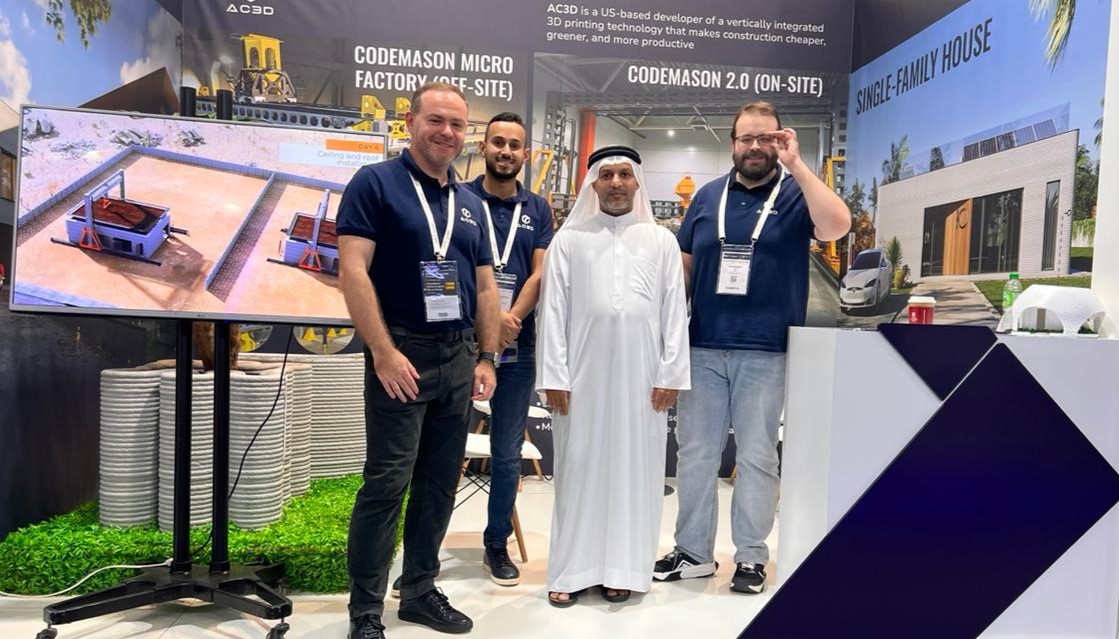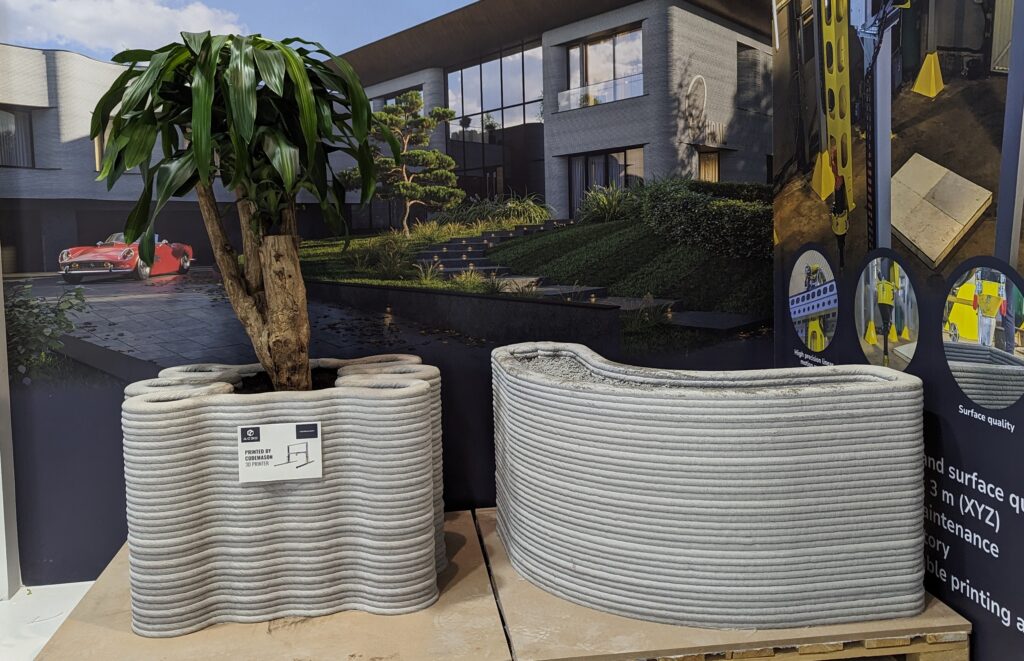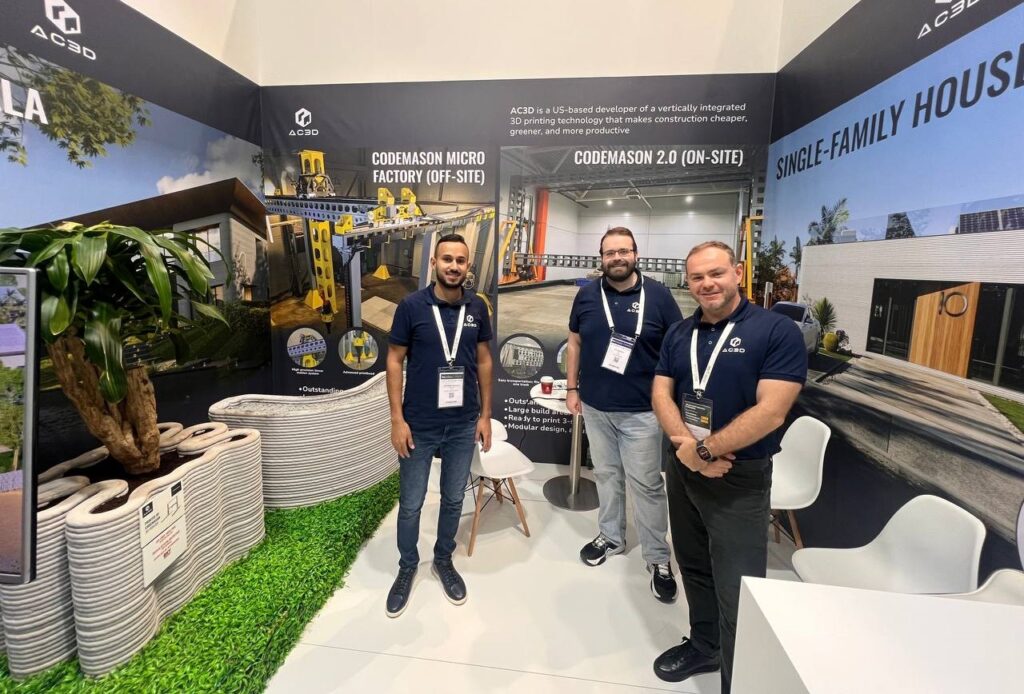Introducing Max from AC3D
Q: Can you introduce yourself and your startup?
A: I’m Max, CEO at AC3D. We are a construction 3D printing company building a full-stack, vertically integrated solution for the construction of tomorrow. Our focus extends beyond 3D printers; we create large machines that print houses and buildings both off-site and on-site. In addition, we produce material mixes and offer essential supplementary services such as architectural, and structural design, software, training, and support. Drawing from over 10 years of executive experience in various fields, including FMCG, retail, and telecommunications, being at the helm of AC3D is a peak in my career. I’ve always been driven by innovation, and construction presents a particularly challenging yet exciting field.
Q: How did you come up with an idea? Was it curiosity, as you just described, or was there something extra?
A: Well, the idea mainly originated from our CEO, Boris Kozlov, a renowned expert in 3D printing in Eastern Europe. While the classic approach to 3D printing involves metal and composites, Boris recognized the underrated potential of concrete 3D printing. Given that the construction industry is the world’s largest, he shared his vision with me. I was eager to join the team, driven by a strong belief in additive manufacturing. Similar to how Henry Ford revolutionized production with the conveyor, we see our approach as the next method of production—a natural shift and a shot worth taking.
Why Alchemist?
Q: What motivated you to join Alchemist?
A: Well, of course, bringing a company from the idea stage to a significant business is a big challenge. The easiest way to achieve this is by assembling a strong team, and when I say “team,” I don’t just mean internal staff but also external support. Alchemist, being a top-notch accelerator in the business-to-business segment, stood out as the best choice for us.
Q: Can you recall and briefly describe the application process that you went through?
A: The application process was quite straightforward. We applied to several top-notch accelerators, and Alchemist, particularly in the business-to-business segment, emerged as the best. The process involved filling out a form where we detailed every aspect of our business, including the business part, technology, product, marketing, and more. After highlighting key points and showcasing our product through demos or videos, the accelerator team reviewed our application. Getting into any accelerator is challenging, and Alchemist, for example, picks only around 10 to 15 startups from a pool of several hundred applicants. If they see potential, the process advances to a panel meeting where you pitch your product, explain its impact, and disruptiveness, and engage in Q&A. If all goes well, you get approved.
Q: Considering the competitive nature of the process, what do you believe sets your company apart to get accepted?
A: It’s a challenging question since understanding it requires assessing our competitors. Accelerators like Alchemist often use a scorecard from panel reviews to make decisions. Factors such as problem/solution assessment, product quality, competitive analysis, team, technology viability, and feasibility are considered. Ultimately, it comes down to votes and feedback. We believe our extensive two-year preparation and background research in the construction industry, combined with the potential impact of our technology, contributed to our success.
Q: In terms of traction, did you already have any clients, and how strict were they regarding this aspect?
A: The importance of clients varies depending on the accelerator and the stage of the startup. In the early stages, some accelerators don’t heavily weigh client presence. While having clients is beneficial, it’s not a strict requirement. For us, at the moment of application, we didn’t have any sales. Given the nature of our startup, which involves the production of large robots with significant costs, the sales cycle takes time. We operate in the business-to-business segment, where a single machine can cost several hundred thousand dollars, and the sales process, considering the high value, requires thorough groundwork before securing the first sale.
Structure of the Alchemist Accelerator Program and the Funding Experience
Q: After getting accepted, what does the Alchemist Accelerator program look like, and how is it structured?
A: The program is quite beneficial, especially for young startups. While the core of our team consists of experienced executives with 10 to 15 years in relevant fields, the mentoring and educational aspects may not be as essential for us. However, for startups, especially those led by individuals with limited experience, the educational program proves incredibly valuable. Alchemist offers a series of educational sessions, including workshops with mentors and additional tasks. Each startup is assigned a personal mentor who focuses on target goals specific to the startup. The support provided operates on several levels, starting with general sessions and workshops, followed by a personal mentor. Additional coaches, such as sales and CEO coaches, can be customized based on the startup’s needs. This multi-level support system allows startups to access as much guidance as they require, making it a valuable resource for everyone, and particularly brilliant for some.
Q: What is the difference between the specific experts you mentioned and the assigned mentors you get?
A: The difference lies in the focus of their roles. Assigned mentors work closely with startups on their goals and progress, tracking key performance indicators (KPIs). The selection of mentors is not predetermined; startups have the flexibility to choose from a list of potential mentors. Meetings and discussions help startups identify mentors who fit their needs and can provide valuable knowledge and feedback. This customized approach ensures that the mentorship is a mutual choice, fostering a productive and collaborative relationship.
Q: Did you receive any funding from the Alchemist Accelerator program?
A: Yes, Alchemist provides funding based on terms and negotiations. Initially, it covers the tuition cost. While they do offer funding, it’s important to note that accelerators, including Alchemist, primarily focus on helping businesses thrive and evolve from ideas. The funding, though provided, is considered minor compared to the invaluable support and resources aimed at transforming innovative concepts into successful businesses.
AC3D’s Milestones, Challenges, and Growth with Alchemist
Q: Can you recall a significant milestone that you achieved during the program with the support of their team?
A: For us, being a unique hardware-focused startup with a prolonged product-to-sales timeline, the main milestone during the program was the extensive network we gained. As a hardware startup, transitioning from the product stage to sales is time-consuming, often taking around a year for the production of the first machine. The Alchemist program provided us with relevant connections, and an efficient network in the realms of investors, potential partners, and corporations. The program’s highlight was the Demo Day, where startups could present achievements and garner investments. This platform facilitated not only investments but also opportunities to forge impactful connections for the future.
Q: Did you face any challenges or come across something that you expected to be different?
A: No, we didn’t encounter any problems. We invested significant effort in understanding what we should gain from the accelerator and how it operates. Consequently, there were no surprises for us.
Q: Compared to other accelerators you’ve participated in, how would you rate Alchemist?
A: Alchemist stands out, especially due to its keen focus on the B2B segment. Their strength lies in their narrow focus, emphasizing networking, direct connections with the right corporations, and providing valuable introductions. In comparison to more agnostic accelerators, Alchemist’s focused approach proves highly beneficial for startups with specific goals, like ours in the B2B segment.
Q: What’s the current status of the company?
A: We’re on the verge of completing our first building in Dubai, a significant milestone for us. While every 3D printing company needs to develop robots and showcase their technology, the real achievement is obtaining permits, ensuring safety, and making the structures commercially viable. Our primary goal now is to finish our first printed houses in the UAE and then in the US. Currently, we’re actively cooperating with the Dubai municipality, and I hope we’ll have the UAE house ready within one or two months.
Advice for Future Alchemist Applicants
Q: Any final feedback or tips for founders considering applying to Alchemist?
A: My advice is that there are numerous accelerators, and Alchemist is just one of them. Every startup should consider participating in at least one accelerator because it’s a valuable experience. Regardless of your experience level, you’re bound to discover something new that could be crucial for success. Good accelerators fill gaps and provide essential elements for startup development. Another piece of advice is not to give up if you face rejection. It’s entirely fine to reapply, even multiple times if you find it viable. Reapplying shows persistence and genuine interest in participating. Rejection doesn’t mean it’s a one-way ticket; you can always try again. They might want to see your progress, assess your traction, or observe how you perform over time. So, keep applying until you achieve success.




